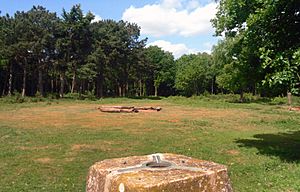Hurst Hill, Oxfordshire facts for kids
| Site of Special Scientific Interest | |
 |
|
| Area of Search | Oxfordshire |
|---|---|
| Interest | Biological Geological |
| Area | 20.6 hectares (51 acres) |
| Notification | 1986 |
| Location map | Magic Map |
Hurst Hill, also called Cumnor Hurst, is a special natural area located west of Oxford in Oxfordshire. It covers about 20.6 hectares, which is roughly the size of 50 football fields! This site is important for both its amazing plants and its ancient rocks. Scientists study Hurst Hill because it helps us understand nature and the Earth's past.
Contents
A Special Place for Nature
Hurst Hill is officially a Site of Special Scientific Interest (SSSI). This means it's a protected area because of its rare wildlife or important geology. It's also a Geological Conservation Review site, which highlights its importance for studying Earth's history.
Plants and Tiny Creatures
The land at Hurst Hill is owned by All Souls College, Oxford. For over fifty years, scientists have been carefully watching the tiny plants that grow here, like mosses and liverworts. These small plants are very sensitive to changes in the environment, so studying them helps us understand the health of the area.
Dinosaurs and Ancient Earth
Hurst Hill is also very important for understanding geology, which is the study of Earth's physical structure and history.
The Camptosaurus Discovery
In 1879, an exciting discovery was made at Hurst Hill. Scientists found a fossil of a large plant-eating dinosaur called Camptosaurus prestwichii. This dinosaur lived about 153 million years ago, during the Upper Jurassic period.
A Bridge to the Past
What makes this discovery even more amazing is that Camptosaurus fossils are usually found in North Africa. Finding one in England suggests that there might have been a "land bridge" connecting Europe and Africa during the Late Jurassic period. This bridge would have allowed dinosaurs to travel between these continents!
Hurst Hill in Literature
Hurst Hill is not just famous for its nature and fossils. It is also mentioned in a well-known poem called The Scholar Gipsy by the poet Matthew Arnold. This shows how the beauty of the hill has inspired people for a long time.

